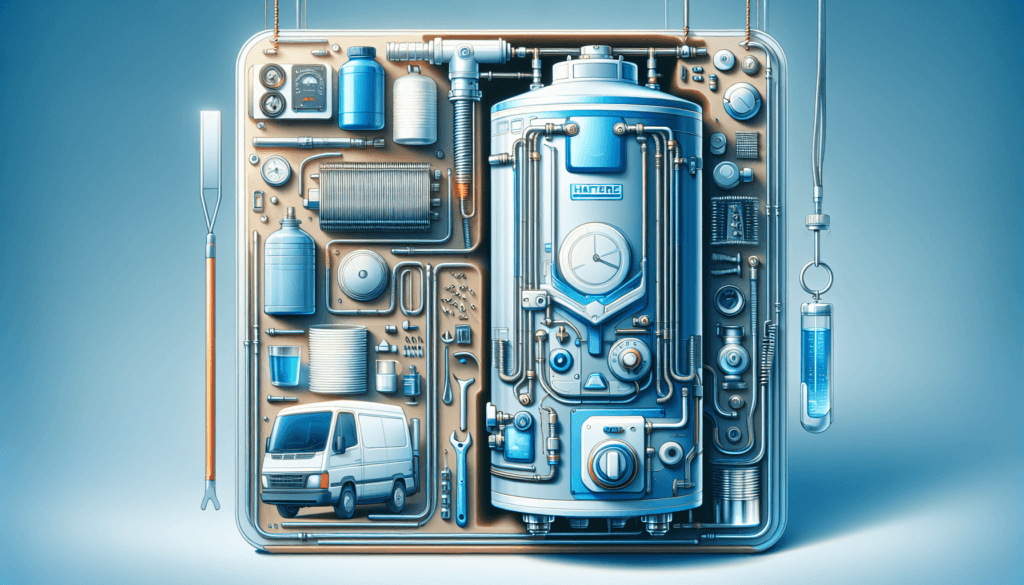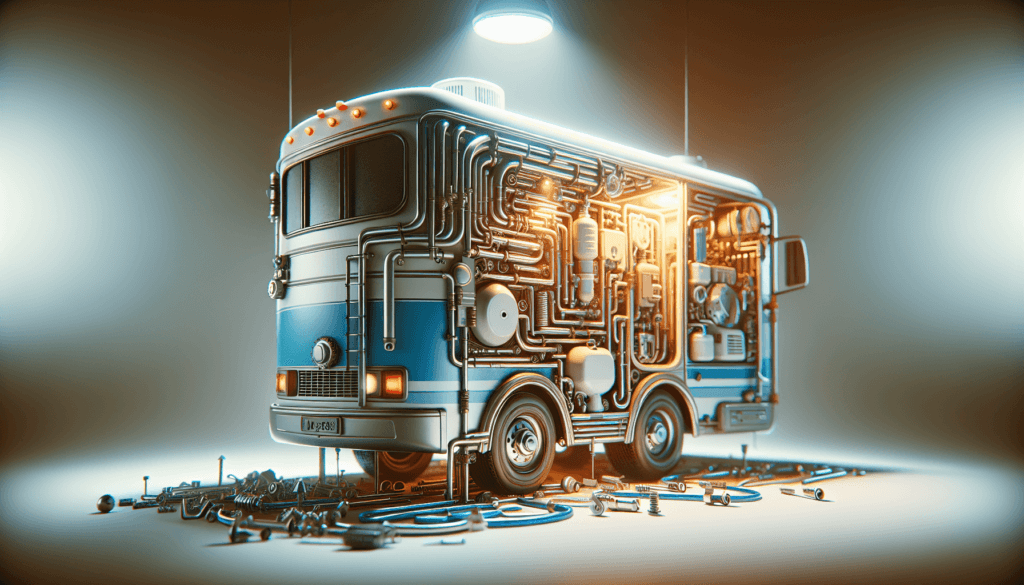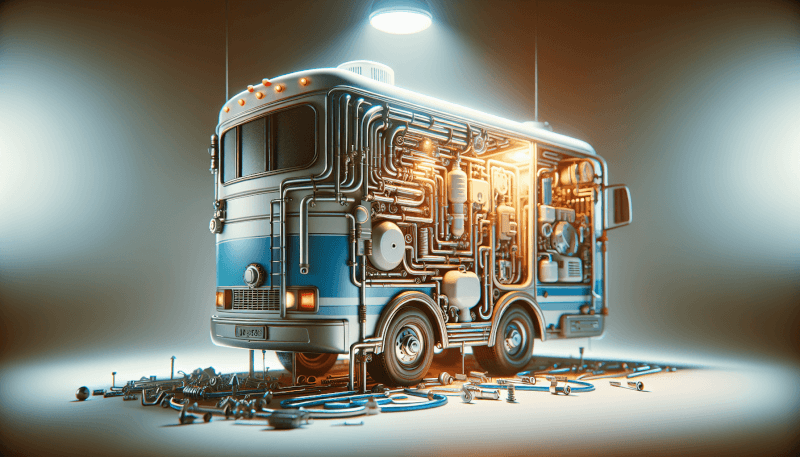Maintaining your RV water heater is essential for a worry-free camping experience. From ensuring efficient performance to preventing costly repairs, regular maintenance can extend the lifespan of your water heater. In this article, we will explore the importance of RV water heater maintenance and provide you with easy-to-follow tips to keep your unit running smoothly. Whether you’re a seasoned RVer or new to the world of camping, this guide will help you keep your water heater in top shape for all your adventures on the road. So let’s dive in and discover the secrets to maintaining your RV water heater!

Why RV Water Heater Maintenance is Important
RV water heater maintenance is essential to ensure the proper functioning, longevity, and efficiency of your water heater. By performing regular maintenance tasks, you can address potential issues before they become major problems and avoid costly repairs. In this comprehensive guide, we will explore the importance of regular maintenance, the components of an RV water heater, routine inspection and cleaning tasks, maintaining proper temperature, anode rod inspections and replacements, winterizing your water heater, dealing with common issues, the need for professional maintenance and servicing, tips for preventing water heater problems, and the overall benefits of regular maintenance.
Importance of Regular Maintenance
Regular maintenance of your RV water heater is crucial because it helps to extend its lifespan, improves its efficiency, saves costs, and prevents potential problems. By taking the time to inspect and clean your water heater, you can identify any leaks or corrosion early on, ensuring that they do not worsen over time. Additionally, maintaining proper temperature settings and regularly checking the thermostat can prevent issues such as insufficient hot water or an overheating heater. Overall, regular maintenance is the key to ensuring your water heater operates smoothly and reliably while providing you with hot water whenever you need it.
Extend the Lifespan of the Water Heater
Proper maintenance of your RV water heater can significantly extend its lifespan. By taking the time to inspect, clean, and address any issues, you can prevent small problems from turning into major malfunctions. Regular maintenance tasks such as flushing the tank and cleaning the burner assembly help to eliminate sediment build-up and maintain the efficiency of the heater. This reduces wear and tear on the system, ultimately prolonging its lifespan and saving you the cost of premature replacements.
Improved Efficiency
Regular maintenance also contributes to improved efficiency of your RV water heater. Over time, sediment and mineral deposits can accumulate in the tank, decreasing the heater’s efficiency and causing it to consume more energy. By flushing the tank and cleaning the burner assembly, you can remove these deposits and ensure optimal performance. Additionally, checking and calibrating the thermostat settings, as well as testing the temperature pressure relief valve, ensures that your water heater operates at the correct temperature, avoiding energy waste and reducing your utility bills.
Cost Savings
Performing regular maintenance on your RV water heater not only extends its lifespan and improves efficiency but also leads to substantial cost savings. By detecting and addressing any issues early on, you can avoid costly repairs or the need for a complete replacement. Additionally, a well-maintained water heater operates more efficiently, cutting down on energy consumption and reducing your utility bills. By investing time and effort into proper maintenance, you can save a significant amount of money in the long run.
Preventative Measures
Regular maintenance acts as a preventative measure to avoid potential problems with your RV water heater. By inspecting for leaks, checking for corrosion, and cleaning the burner assembly, you can catch issues before they escalate and cause major damage. This proactive approach to maintenance helps you identify and address any problems early on, preventing the inconvenience and expense of dealing with a malfunctioning water heater while on your RV trips. By implementing routine maintenance tasks, you can enjoy peace of mind and trust in the reliable performance of your water heater.

Understanding Your RV Water Heater
Before diving into the maintenance tasks, it is important to understand the different types of RV water heaters, their components, and the differences between gas and electric water heaters.
Types of RV Water Heaters
RV water heaters generally come in two types: tankless and tank-style heaters. Tankless water heaters, as their name suggests, heat the water on demand without the need for a storage tank. These units are more energy-efficient and take up less space, making them popular choices for RV owners. On the other hand, tank-style water heaters store a fixed amount of hot water in a tank, which is then maintained at a specific temperature until it is needed.
Components of a Water Heater
Regardless of the type, RV water heaters have several common components. These typically include a burner assembly, a thermostat, a temperature pressure relief valve, an anode rod, and a tank or heat exchanger. Each of these components plays a vital role in the proper functioning of the water heater and requires regular maintenance to ensure optimal performance.
Gas vs. Electric Water Heaters
Another distinction to be aware of is the difference between gas and electric water heaters. Gas water heaters rely on propane or natural gas to heat the water, while electric water heaters use an electric heating element. Both types have their advantages and maintenance requirements, so it is important to consider the specific needs of your RV and choose the appropriate water heater accordingly.
Routine Inspection and Cleaning
Regular inspection and cleaning are essential for maintaining the performance and longevity of your RV water heater. Here are some important tasks to include in your maintenance routine:
Inspecting for Leaks
Start by inspecting your water heater for any signs of leaks. Check for water stains, drips, or pooling water around the heater. Addressing leaks promptly is crucial, as they can lead to severe damage and even pose a safety risk. If you notice any leaks, it is advisable to have them repaired by a professional RV technician.
Check for Corrosion
Corrosion is another common issue that can affect the performance and lifespan of your water heater. Regularly check for signs of rust or corrosion on the exterior of the water heater and its components. If corrosion is present, it is important to address it quickly to prevent further damage. Cleaning the affected area and applying a protective coating can help to mitigate the issue.
Flushing the Tank
Flushing the tank is an important maintenance task that helps remove sediment and mineral deposits that accumulate over time. To flush the tank, start by turning off the water heater and allowing it to cool down. Once cooled, close the incoming water supply and open the pressure relief valve to release any built-up pressure. Connect a hose to the drain valve at the bottom of the tank and direct the other end to an appropriate drainage location. Open the drain valve and let the water flow until it runs clear, indicating that the tank is free of sediment.
Cleaning the Burner Assembly
The burner assembly plays a critical role in heating the water within your RV water heater. Over time, it can become dirty or clogged, affecting the efficiency and performance of the heater. Cleaning the burner assembly is a necessary maintenance task to ensure optimal operation. Refer to your water heater’s manufacturer instructions for detailed steps on how to clean the burner assembly properly.
Maintaining Proper Water Heater Temperature
Maintaining the proper temperature of your RV water heater is essential for safety and comfort. Here are some important tasks to help you achieve and maintain the desired temperature:
Checking Thermostat Settings
Start by checking the thermostat settings of your water heater. Ensure that the temperature is set at a safe and comfortable level, typically between 120 to 140 degrees Fahrenheit. Avoid setting the temperature too high, as it can cause scalding and increase the risk of burns. If you are unsure about the appropriate setting, consult your water heater’s manual or seek advice from a professional RV technician.
Calibrating the Thermostat
Over time, the thermostat of your water heater may become inaccurate, leading to temperature fluctuations. To ensure consistent and reliable performance, it is advisable to calibrate the thermostat periodically. Follow the manufacturer’s instructions for your specific water heater model to properly calibrate the thermostat and maintain the desired temperature.
Temperature Pressure Relief Valve Testing
The temperature pressure relief valve is a critical safety feature of your RV water heater. This valve helps to release excess pressure and temperature in case of a malfunction. It is important to regularly test the valve to ensure it is functioning properly. Follow the manufacturer’s instructions to conduct a test safely and effectively. If you find that the valve is not working correctly, it must be replaced by a qualified RV technician.
Anode Rod Inspection and Replacement
The anode rod is an essential component of your RV water heater that helps prevent corrosion. Here’s what you need to know about the anode rod, how to inspect it, and when to replace it:
Understanding the Anode Rod’s Role
The primary role of the anode rod is to attract corrosive elements, such as minerals and electrolysis, which would otherwise attack the tank and other metal components of the water heater. As the anode rod attracts these corrosive elements, it gradually gets consumed and deteriorates over time. Regular inspection and replacement of the anode rod are crucial to maintain the integrity of the water heater.
How to Inspect the Anode Rod
To inspect the anode rod, start by locating it on top of the water heater tank. Typically, it is accessible through a small cover or a pipe near the top. Use an appropriate tool, such as a socket wrench, to remove the anode rod. Check for signs of significant corrosion or a decrease in rod thickness. If the rod is less than 50% intact, it is time to replace it.
When to Replace the Anode Rod
The frequency of anode rod replacement depends on several factors, including water quality, frequency of use, and the specific type of anode rod. In general, it is recommended to inspect the anode rod annually and replace it when it is significantly deteriorated or less than 50% intact. Regularly replacing the anode rod ensures that your water heater is protected from corrosion and continues to operate optimally.
Winterizing Your RV Water Heater
Preparing your RV water heater for winter is crucial to prevent freezing and potential damage. Follow these steps to properly winterize your water heater before the cold weather arrives:
Preparing for Winter
Before winterizing your water heater, ensure that it is completely turned off and that the power or propane supply is disconnected. Additionally, drain any remaining water from the tank and close the tank’s drain valve. It is also advisable to consult your RV owner’s manual for any specific winterizing instructions.
Draining the Water Heater
Draining the water heater is a critical step in the winterization process. Start by verifying that the water heater is cool and the power or propane supply is disconnected. Locate the water heater drain valve, typically found at the bottom of the tank. Attach a hose to the drain valve and direct the other end to an appropriate drainage location, ensuring that the water can flow freely. Open the drain valve and let the water completely drain from the tank.
Bypassing the Water Heater
To further protect your water heater during winter, it is recommended to bypass it entirely. Bypassing the water heater allows you to isolate it from the rest of the RV’s water system, preventing antifreeze from entering the tank. Consult your RV owner’s manual or seek guidance from a professional RV technician to properly bypass the water heater.
Insulating the Water Heater
Insulating your water heater is another measure to protect it from freezing temperatures. Wrap the tank and its exposed pipes with insulation, such as pipe wrap or foam insulation tape. This helps to retain heat and prevent freezing. Additionally, consider using a water heater blanket or RV-specific water heater insulation kit for added insulation and protection.
Dealing with Common Issues
While proper maintenance can help prevent many issues, it is essential to know how to address common problems that may arise with your RV water heater. Here are some common issues and suggested solutions:
No Hot Water
If you are not getting hot water from your RV water heater, start by checking the thermostat settings to ensure it is properly adjusted. If the settings are correct, check if the pilot light or electric heating element is functioning. A malfunctioning pilot light may require relighting, while a faulty electric heating element may need replacement. If you are unsure or unable to resolve the issue, consult a professional RV technician.
Pilot Light Issues
For RV water heaters equipped with a gas pilot light, a common issue is the pilot light going out. This can be caused by airflow issues, a faulty thermocouple, or a malfunctioning gas valve. Check for any obstructions in the pilot light assembly and clean them if necessary. If cleaning the assembly does not resolve the issue, it is recommended to have a professional RV technician inspect and repair the gas components.
Low Water Pressure
Low water pressure can be frustrating, particularly when using multiple faucets simultaneously. Start by checking the water pressure regulator on your RV and ensure that it is set to the appropriate level. If the pressure regulator is functioning correctly, the issue may be related to clogged or restricted pipes. Thoroughly inspect your RV’s plumbing system for any blockages and clean or replace affected pipes, if necessary.
Strange Noises
Unusual noises coming from your RV water heater can indicate underlying issues. A common cause of strange noises is sediment build-up in the tank, which can create popping or rumbling sounds. Flushing the tank regularly helps to eliminate this buildup. If the noises persist or are accompanied by other issues, it is recommended to seek the assistance of a professional RV technician to diagnose and address the problem.
Professional Maintenance and Servicing
While regular maintenance tasks can be performed by RV owners, there are instances where professional help is necessary. Here are some scenarios in which seeking professional maintenance and servicing is advisable:
When to Seek Professional Help
If you encounter issues that are beyond your knowledge or skill level, it is recommended to seek professional help. This includes complex repairs, gas-related issues, electrical problems, or any situation where you are uncertain about the appropriate course of action. A qualified RV technician has the expertise and experience to diagnose and resolve problems effectively and safely.
Finding a Qualified RV Technician
When searching for a qualified RV technician, look for professionals who specialize in RV water heater maintenance and repairs. They should have relevant certifications, extensive knowledge of RV systems, and a track record of providing reliable and trustworthy service. Seek recommendations from fellow RV owners or contact reputable RV service centers for assistance.
Delegating the Job to Experts
While performing maintenance tasks yourself can be rewarding, some RV owners prefer to delegate the job to experts. By having a professional service your RV water heater, you can ensure that all maintenance tasks are performed correctly and efficiently. This option provides peace of mind and saves you time and effort.
Tips for Preventing Water Heater Problems
Prevention is key when it comes to avoiding water heater problems in your RV. Here are some additional tips to help you maintain a well-functioning water heater:
Regularly Flush the Tank
Flushing the tank regularly is crucial in preventing sediment and mineral deposits from accumulating. Set a schedule to flush the tank at least once a year, or more frequently if you notice any signs of sediment buildup. This simple maintenance task helps to maintain the efficiency of the water heater and prolong its lifespan.
Use a Water Softener
If your RV regularly encounters hard water, consider using a water softener to reduce the mineral content. Hard water can lead to mineral buildup in the tank and other plumbing components, decreasing the efficiency of the water heater. A water softener helps to prevent this issue, ensuring optimal performance and reducing the need for maintenance.
Properly Store the RV
When storing your RV for extended periods, it is important to properly winterize and prepare the water heater. Follow the winterization steps outlined earlier in this guide to protect the water heater from freezing and potential damage. Additionally, consider draining the water system and removing any excess water to prevent mold or bacterial growth.
Conclusion
Regular maintenance of your RV water heater is crucial for ensuring a well-functioning, efficient, and reliable source of hot water during your travels. By performing routine inspection and cleaning, maintaining proper temperature settings, inspecting and replacing the anode rod, properly winterizing your water heater, and addressing common issues, you can enjoy a stress-free RV experience. Regular maintenance not only extends the lifespan of your water heater but also saves you money on costly repairs, reduces energy consumption, and provides peace of mind on your RV trips. So, make RV water heater maintenance a priority and enjoy the many benefits it brings to your RV lifestyle.


